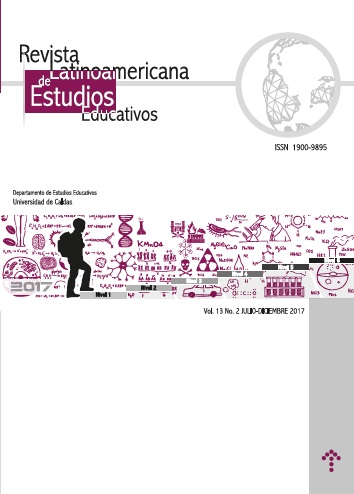Authors
Abstract
The present article is the result of a research carried out within the framework of the Masters in Education of the Catholic University of Manizales, in which the topics of Formation and Pedagogies of the Meeting were approached, which were permeated by the theory and methodologies Of the studies associated with the Social Imaginaries. Around these matters, we sought to understand the social imaginaries of the teachers of two institutions of Antioquia, about the formation and established relationships with the Other, this was achieved from the approach and design of complementarity (Murcia and Jaramillo, 2008). Said approach, recognized at first the principle of ethnographic reflexivity for the approach to the social realities of the School; Then, they were deepened through in-depth interviews and processed with support of the categorial method. The interpretation was made from the analysis of the discourse and the triangulation of the information. The results show some bets of the teachers to renew and to continuously rethink their work, becoming responsible for the Other from the welcome, the dialogue, the encounter, the look, the gesture; Committed in a determined way by an education “other”, in a school that is thought for and with the other.
References
Bárcena, F. y Mélich, J. (2000). La Educación como Acontecimiento ético. Barcelona: Paidós.
Castoriadis, C. (1989). La institución imaginaria de la sociedad. Vol. 2. El imaginario social y la institución. Barcelona: Tusquets Editores.
Castoriadis, C. (1993). La Institución Imaginaria de la Sociedad. Buenos Aires: Tusquets.
Castoriadis, C. (1997). Ontología de la creación. Bogotá: Colección pensamiento crítico contemporáneo, Ensayo - error.
Freire, P. (2007). La educación como práctica de la libertad. México. Siglo XXI editores.
Han, B-C. (2014). La agonía del eros. Barcelona: Herder.
Jaramillo, D.A. y Murcia, N. (2013). Los mutantes de la escuela. Entramado, 9, 162-174. Recuperado de http://www.redalyc.org/articulo.oa?id=265429948011
Jaramillo, D.A. y Murcia, N. (2014). Hacia una pedagogía del encuentro: apuestas por la relación cuerpo-alteridad en educación. Revista de investigaciones UCM, 14 (2), 142-149.
Jaramillo, D.A. y Orozco, M. (2015). ¿Hablar del otro o hablar con el otro en educación? Revista Latinoamericana de Estudios Educativos, 11 (2), 47-68.
Levinas, E. (2015). Ética e infinito. Madrid. Machado libros.
Macedo, D. (2012). Una Pedagogía Antimétodo. Una perspectiva Freiriana. Educación XXI, 1-9.
Mélich, J.-C. (2002). Filosofía de la finitud. Barcelona: Herder.
Mélich, J.-C. (2010). El otro de sí mismo. Por una ética desde el cuerpo. Barcelona: Editorial UOC.
Murcia, N., y Jaramillo, L.G. (2008). Investigación cualitativa: La complementariedad, una guía para abordar estudios sociales. Armenia, Colombia: Editorial Kinesis.
Murcia, N. (2011). Imaginarios sociales: preludios sobre universidad. Imaginario, imaginación, representación y simbólico: complementariedad y operacionalización de un diseño. Alemania: EAE editores.
Murcia, N. (2012). La Escuela como imaginario social: Apuntes para una Escuela dinámica. Revista Magis, 6 (12), 53-70. Recuperado de http://dx.doi.org/10.15332/s2011-8643.2012.0012.03
Murcia, N. y Jaramillo, D. (2014). Educabilidad y normalidad. Imaginarios de maestros en formación. Revista de investigaciones Sophia, 169-182.
Orrego, J.F. (2007). La pedagogía como reflexión del ser en la educación. Revista latinoamericana de estudios educativos, 3 (1), 27-39.
Remolina, G., Baena, G. y Gaitán, C. (2001). Tres palabras sobre formación. Bogotá: Pontificia Universidad Javeriana.
Skliar, C. (2010). Los sentidos implicados en el estar juntos de la educación. Revista Educación y Pedagogía, 22 (56), 101-111.
Skliar, C. y Larrosa, J. (2009). Experiencia y Alteridad en Educación. Santa Fe: Homo Sapiens.
Skliar, C. y Téllez, M. (2008). Conmover la educación: Ensayos para una pedagogía de la diferencia. Buenos Aires: Centro de publicaciones educativas y material didáctico.

 PDF (Español)
PDF (Español)
 FLIP
FLIP
























